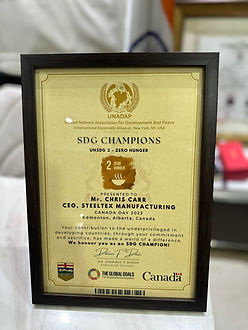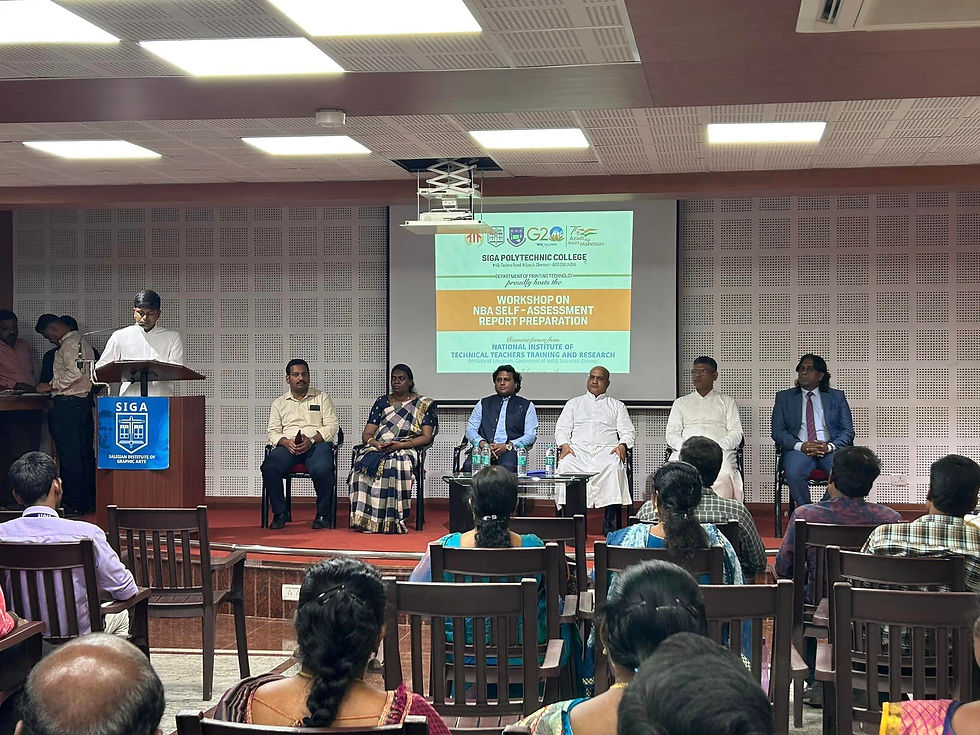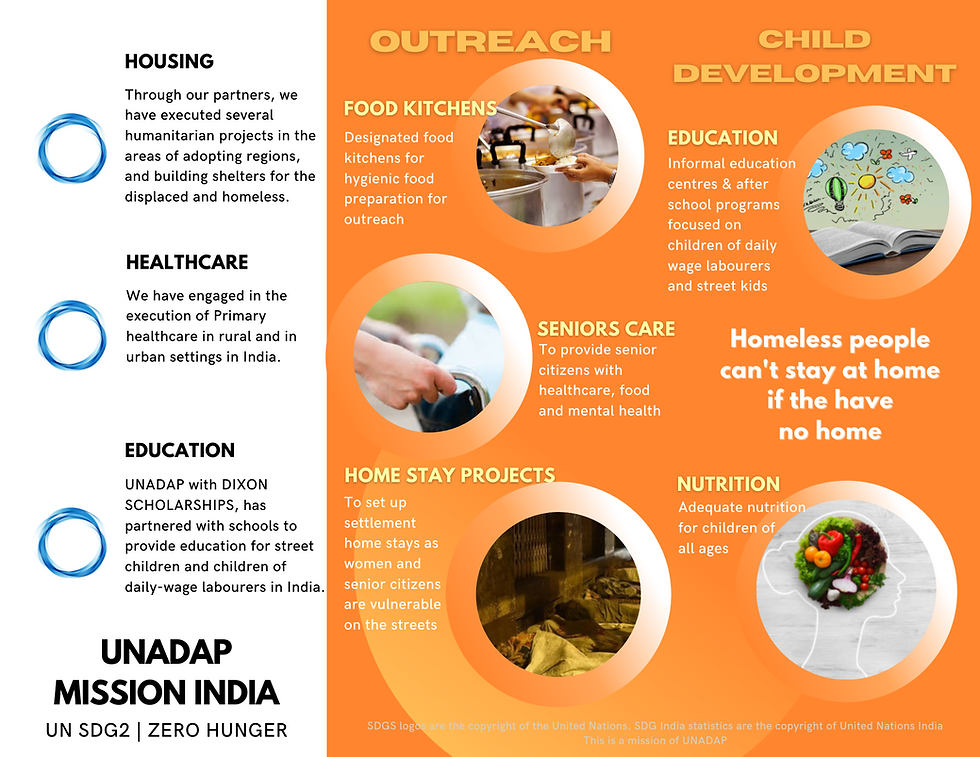PEACE, JUSTICE & STRONG INSTITUTIONS
UNADAP
International Diplomatic Alliance
About | ACADEMY | COP26 PRESIDENCY | ESG | UN-SDG | PUBLISHING | Team | GWA | Clean energy | Media | Contact | Internships | News
SDG CHAMPION
STEELTEX, CANADA - SDG2




Steeltex Manufacturing, has been awarded with the citation of an ‘SDG CHAMPION’, for its contribution to SDG 2 - ZERO HUNGER. On Canada Day, the citation was received by Mr. Chris Carr, Founder/ CEO of Steeltex Manufacturing and conferred by H.E. Dr. Dominic F Dixon, Executive Director of UNADAP; at the Steeltex HQ in Edmonton, Canada. Since 2017, Steeltex and UNADAP have been in collaboration towards SDG2 in Canada and India. Steeltex has adopted a ‘Canada First’ policy, employing residents of Canada in various capacities, whilst contributing to the economic and humanitarian development, domestically and in developing nations. WHY SDG 2 - ZERO HUNGER? Unfortunately, extreme hunger and malnutrition remain a huge barrier to development in many countries. There are 821 million people estimated to be chronically undernourished as of 2017, often as a direct consequence of environmental degradation, drought and biodiversity loss. Over 90 million children under five are dangerously underweight. WHAT IS SDG? The SDGs were formulated in 2015 by the United Nations General Assembly (UNGA) as part of the Post-2015 Development Agenda, which sought to create a future global development framework to succeed the Millennium Development Goals, which ended that year. They were formally articulated and adopted in a UNGA resolution called the 2030 Agenda, known colloquially as Agenda 2030.
Seminar: Workshop on NBA Self-Assessment Report Preparation | SIGA Polytechnic College, Chennai, India.
Was graciously invited as the ‘Chief Guest’ for the National Institute of Technical Teachers Training And Research, held at SIGA Polytechnic College, Chennai, India.




The purpose of the three days seminar was to champion Heads of Departments of South India’s leading Technical Colleges on ‘Internationalisation of Academics’ through the National Board of Accreditation (NBA). The purpose of the accreditation by NBA is to promote and recognize excellence in technical education in colleges and universities - at both the undergraduate and post graduate levels. This means, that foreign students could do part education or transfer to an Indian college on a credit-based system; whilst Indian students could study abroad using the same system, without having to lose continuity from their Indian degree courses.
As the Executive Director & Director General of UNADAP/ IDA & MORE, it was a privilege to honour SIGA Polytechnic College with a citation for their commitment and contribution to the United Nations Sustainable Goals (SDG), 1 - No Poverty & 2 - Quality Education. The citation was presented to the Principal, Rev. Fr. P T Joseph, graced by the Rector, Rev. Fr. Dominic Joseph Matthews.
As a global advisory for the Salesians of Don Bosco (SDB), I’m part of the team that is working towards the installation of SIGA in the United States and Canada. SIGA is rated top most for technical education in India. Most students, especially Anglo Indians have been blessed by SIGA, that thousands have migrated to Australia with this technical education.
As a personal testimony, I am what I am today, because of how the Lord used SIGA to transform my life and character. Stemming from a poverty stricken family and an academic failure; SIGA, was my heaven on earth, where I was taught the importance of character and education. It is an absolute honour, that DIXON Scholarships sponsors the education of several boys from deprived economic backgrounds, regardless of creed, religion or domicile.
Jai Hind!
ZERO HUNGER OUTREACH
NO ONE SHOULD GO TO BED HUNGRY!
‘Athmanirbhar Bhart’, ‘self-reliant India’
"Each day, 25,000 people, including more than 10,000 children, die from hunger..." United Nations
UNADAP FOOD PROGRAMME
ZERO HUNGER - ATHMANIRBHAR BHARAT
Hyderabad, Andhra Pradesh
Programme Director: Ms. Leema Rose
Food menu: Indian-vegetarian-organic Submarine-sandwich and delicious cottage cheese & veggie wraps
Published by,
Communications Director, UNADAP
With the urgent appeal from the UN Secretary General to eradicate hunger, UNSDG 2 (ZERO HUNGER), and Prime Minister Modi's Athmanirbhar Bharat - self reliant India drive, UNADAP acknowledges that we are just a drop in the ocean to eradicate ‘acute hunger’ starting with India. As we do our little bit, we are excited about our new concept of food distribution.




STUDY: Most food distribution programmes in India, including UNADAP, in good faith, are served with rice, India's staple diet, which is not the healthiest to consume for all meals. Many outreach charity programs in India, distribute coloured-rice and sometimes with no gravy or a side-dish, making the rice dry and unpalatable. Furthermore, the food is usually served in non-eco-friendly aluminium foil packaging.
There are places as ISKON that really take care in the nutrition values for food distribution and we need to learn from them.
The issue with rations and groceries distribution is that the poor have little or no fuel to cook the raw supplies, causing the supplies to go stale, and most are homeless. Another issue is that the supply of groceries helps in the long-term, but does not solve the immediate need for a person to have a meal. The United Nations has estimated that, "Each day, 25,000 people, including more than 10,000 children, die from hunger and related causes. Some 854 million people worldwide are estimated to be undernourished, and high food prices may drive another 100 million into poverty and hunger." (source)
When our ‘Food Programme’ team had conducted a study on the beneficiaries of such foods, the recipients were grateful but yet not so happy with the status quo, as they feel deprived and outcast with what they type of food they receive. During one such outreach programme, a child who along with her parents and friends were seeking help on road, was not too pleased to eat the coloured-rise that was distributed and when we enquired, she and friends who tagged along stated that "everyone gives us rice all the time and sometimes it's leftovers and sometimes it's only coloured rice and we have been eating it all our lives." Her father said that they were however grateful for whatever they received. Then the child held the hand of the Executive Director, Dr. Dixon and said, "Uncle, can you buy me a roll (wrap)", as she pointed to restaurant near by, and stated that she wanted a veg roll since she was a Hindu vegetarian. Dr. Dixon stated that if his own niece or nephew had asked him for a wrap or a burger, he would never refuse. Thus our new menu was born and out of love.
RESULT: Therefore, our team at UNADAP decided that we must do better as a nation and give our fellow-Indians a sumptuous-healthy-desi meal. After weeks of discussions with chefs and dieticians, we have designed two meal packages as we partnered with leading food service providers, pan India for our food programme. The menu is designed as Indian-vegetarian-organic meals comprised of Submarine-sandwiches and delicious cottage cheese & veggie wraps, made with wheat bread, filled with cottage cheese, capsicum, tomatoes, onions, sprinkler power for the desi-tingle on the palette and sauces with additional condiments. The packing used are biodegradable and ecological paper, with zero usage of plastic.
Considering climate-change and the soaring heat temperatures in India, a tetra pack of a healthy-flavoured-milkshake, made with fortified toned milk, was also provided. We have removed the plastic straws from the pack and cut the pack to drink directly from it.
India must become ‘Athmanirbhar Bhart’, ‘self-reliant India’ as is Prime Minister Modi’s economic vision and economic development in the country.
UNADAP has over 1500 volunteers pan India, and this food programme will run for the next three months to address the need of acute hunger, with the hope that more individuals, more families, more corporates will do their little bit to eradicate acute hunger.
As a rule, we do not publish images of the poor receiving food packages, but in this post, we've expressed the chronic situation of poverty, as people are going to bed hungry in the desperate climate conditions, unable to ask for help due to soaring temperates. We never post images of children receiving food even though dozens have received it.
It is our hope that within a city, at every zone, individuals, families, and corporates have such outreaches so that no one goes to bed hungry!
JAI HIND!
UNADAP - UN SDG ZERO HUNGER
DUBAI & INDIA CHAPTERS
Her Excellency Dr. Dena Assaf the UN chief (Resident coordinator) of the United Nations in the United Arab Emirates, graciously welcomed Dr. Dominic F Dixon, the Executive Director of UNADAP in Dubai. Lengthy discussions were held on world peace and diplomatic dialogue, and geopolitical reconciliation; with the intention of ZERO HUNGER.





UNADAP has developed an organized, ‘each-one-reach one’, and ‘one-community-to another’ outreach modality for food distribution for anyone in need. As shown in the picture, at the DUBAI chapter, we use biodegradable packaging, with zero plastic usage to package the produce. All produce and essentials are within the national nutritional standards. This project is led by our regional coordinators, Nifty Fernandes Vilma Sanctis Phillips & Renfert Philips, Marchita Fernandes.
The total expat population in UAE has now come to 8.92 million, which constitutes approximately 90% of the population. Many expats are from developing nations and have been hit hard due to the prevailing Covid crisis, and many don’t have enough for their basic needs, with the burden to send financial support to their families back home.
The India chapters have been executing the ZERO HUNGER projects in the regions of Chennai, Hyderabad, Bangalore and Kolkata, through our over 1500 volunteers and channel partners.
We at UNADAP are cognisant of the fact it takes a collective effort to achieve the hope of feeding everyone. Some sow in money, some sow in outreach, some sow in provisions, some sow in cooking, and the efforts continue.
As we do our small, yet significant bit, we encourage food missions for everyone in your own regions, and in your own way that it takes one to feed one. Perhaps, check on your neighbors and your neighbourhood to see that no one goes to bed hungry.
Should you require the assistance of UNADAP’s expertise is food distribution, or would like us to do it on your behalf, you may reach out to us, office@unadap.org.
Statement of Dr. Dixon: I say this as a testimonial: With the command to practice what I preach, during the COVID crisis, I gave away more than 90% of what I had, barring my personal items. We set up a Scholarship fund, organized outreach food programs, and assisted a few families to cover their home rentals. Many leaders have testified to this, and can be verified at, https://www.dominicdixon.net/scholarships. It is with this impertinence, I appeal that each one reach one!

SDG 2: ZERO HUNGER
UNADAP has worked with several entities in rural India, to execute the UN's visions for ZERO HUNGER
Our modus operandi has been to sponsor small rural hamlets and settlements, to systematically ensure a staple diet, with an adequate nutrition. India being a predominately Hindu nation, we are sensitive to the the dos and don'ts of dietary intake as specified by the state government. In caring for the nutrition of children, we understand the mission of the state government and work towards the mission of the state.
IMAGE DATA SOURCE: United Nations in India
Targets
By 2030, end hunger and ensure access by all people, in particular the poor and people in vulnerable situations, including infants, to safe, nutritious and sufficient food all year round.
By 2030, end all forms of malnutrition, including achieving, by 2025, the internationally agreed targets on stunting and wasting in children under 5 years of age, and address the nutritional needs of adolescent girls, pregnant and lactating women and older persons.
By 2030, double the agricultural productivity and incomes of small-scale food producers, in particular women, indigenous peoples, family farmers, pastoralists and fishers, including through secure and equal access to land, other productive resources and inputs, knowledge, financial services, markets and opportunities for value addition and non-farm employment.
By 2030, ensure sustainable food production systems and implement resilient agricultural practices that increase productivity and production, that help maintain ecosystems, that strengthen capacity for adaptation to climate change, extreme weather, drought, flooding and other disasters and that progressively improve land and soil quality.
By 2020, maintain the genetic diversity of seeds, cultivated plants and farmed and domesticated animals and their related wild species, including through soundly managed and diversified seed and plant banks at the national, regional and international levels, and promote access to and fair and equitable sharing of benefits arising from the utilization of genetic resources and associated traditional knowledge, as internationally agreed.
Increase investment, including through enhanced international cooperation, in rural infrastructure, agricultural research and extension services, technology development and plant and livestock gene banks in order to enhance agricultural productive capacity in developing countries, in particular least developed countries.
Correct and prevent trade restrictions and distortions in world agricultural markets, including through the parallel elimination of all forms of agricultural export subsidies and all export measures with equivalent effect, in accordance with the mandate of the Doha Development Round.
Adopt measures to ensure the proper functioning of food commodity markets and their derivatives and facilitate timely access to market information, including on food reserves, in order to help limit extreme food price volatility.
